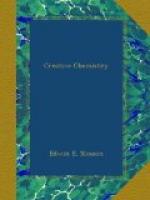The oil-bearing seeds of the tropics are innumerable and will become increasingly essential to the inhabitants of northern lands. It was the realization of this that brought on the struggle of the great powers for the possession of tropical territory which, for years before, they did not think worth while raising a flag over. No country in the future can consider itself safe unless it has secure access to such sources. We had a sharp lesson in this during the war. Palm oil, it seems, is necessary for the manufacture of tinplate, an industry that was built up in the United States by the McKinley tariff. The British possessions in West Africa were the chief source of palm oil and the Germans had the handling of it. During the war the British Government assumed control of the palm oil products of the British and German colonies and prohibited their export to other countries than England. Americans protested and beseeched, but in vain. The British held, quite correctly, that they needed all the oil they could get for food and lubrication and nitroglycerin. But the British also needed canned meat from America for their soldiers and when it was at length brought to their attention that the packers could not ship meat unless they had cans and that cans could not be made without tin and that tin could not be made without palm oil the British Government consented to let us buy a little of their palm oil. The lesson is that of Voltaire’s story, “Candide,” “Let us cultivate our own garden”—and plant a few palm trees in it—also rubber trees, but that is another story.
The international struggle for oil led to the partition of the Pacific as the struggle for rubber led to the partition of Africa. Theodor Weber, as Stevenson says, “harried the Samoans” to get copra much as King Leopold of Belgium harried the Congoese to get caoutchouc. It was Weber who first fully realized that the South Sea islands, formerly given over to cannibals, pirates and missionaries, might be made immensely valuable through the cultivation of the coconut palms. When the ripe coconut is split open and exposed to the sun the meat dries up and shrivels and in this form, called “copra,” it can be cut out and shipped to the factory where the oil is extracted and refined. Weber while German Consul in Samoa was also manager of what was locally known as “the long-handled concern” (Deutsche Handels und Plantagen Gesellschaft der Suedsee Inseln zu Hamburg), a pioneer commercial and semi-official corporation that played a part in the Pacific somewhat like the British Hudson Bay Company in Canada or East India Company in Hindustan. Through the agency of this corporation on the start Germany acquired a virtual monopoly of the transportation and refining of coconut oil and would have become the dominant power in the Pacific if she had not been checked by force of arms. In Apia Bay in 1889 and again in Manila Bay in 1898 an American fleet faced a German fleet ready for action while a British




